Index relies entirely on the support of donors and readers to do its work.
Help us keep amplifying censored voices today.
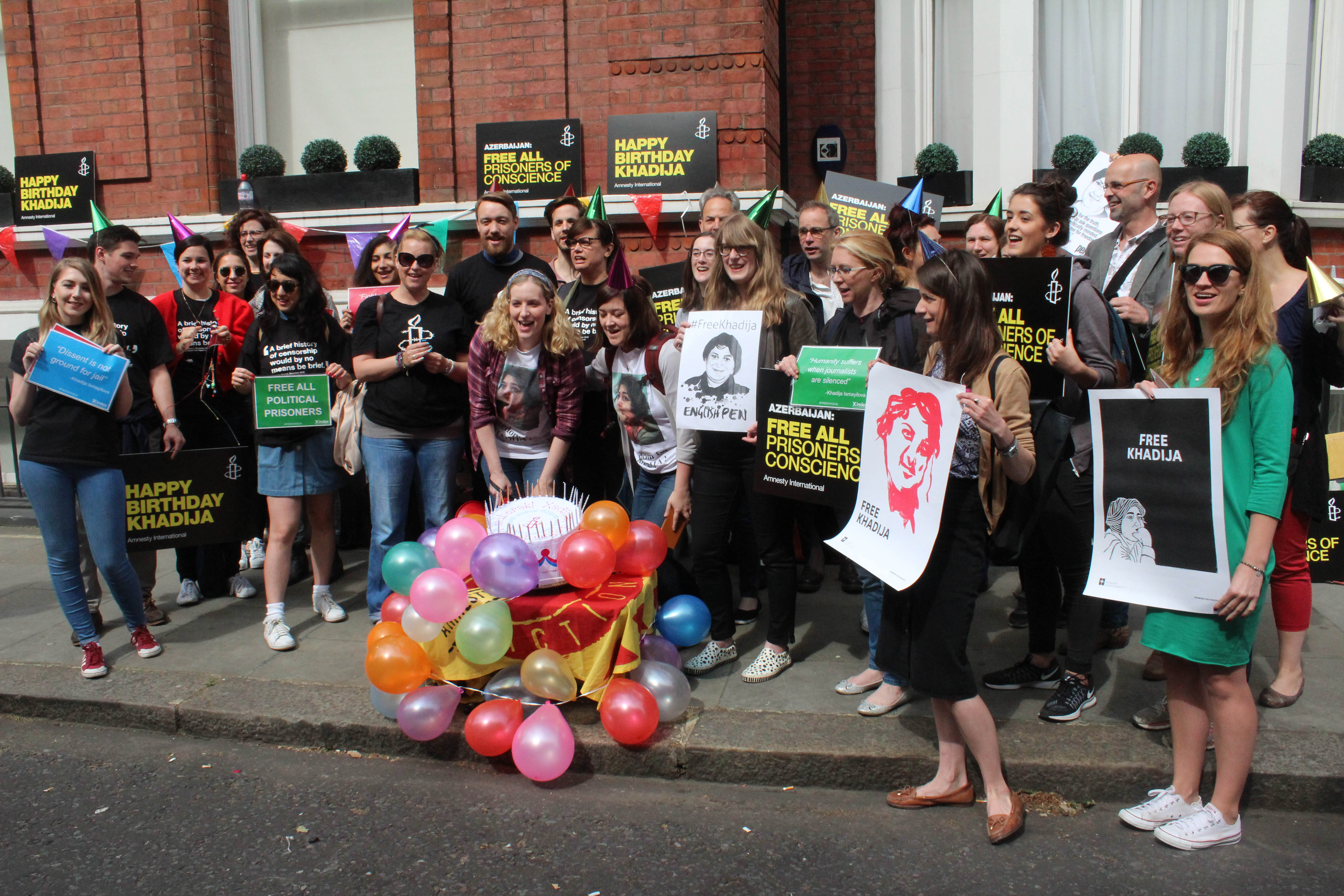
Protest for Khadija Ismayilova, Azerbaijan embassy, London. Credit: Cat Lucas, English Pen
Azerbaijani investigative journalist Khadija Ismayilova may have been released from prison on Wednesday, but two trumped-up charges against her — illegal entrepreneurship and tax evasion –remain. Her seven-and-a-half-year jail sentence has only been reduced to a three-and-a-half-year suspended term and she isn’t free to leave the country.
Today is Ismayilova’s 40th birthday and to mark the occasion, protesters gathered at 40 different demonstrations from around the world, not just to celebrate, but to call for all charges against her to be quashed. Index joined other members of the Sports for Rights coalition at the Azerbaijani embassy in London (see above).
Happy birthday Khadija! pic.twitter.com/FGPlA4Y3xt
— Index on Censorship (@IndexCensorship) May 27, 2016
“Let’s take a moment to celebrate the work that’s been done by this remarkable woman,” Rebecca Vincent, the co-ordinator of the Sport for Rights campaign, told demonstrators.
Currently, around 70 political prisoners — including journalists, bloggers, activists and religious followers — sit in Azerbaijani jails, and Vincent called on protesters to sustain their focus on all of them. “That’s what Khadija has asked for for her birthday,” she said.
Seymur Hezi is an Azerbaijani journalist serving a five-year prison sentence on charges of “aggravated hooliganism”. Hezi, who contributed to the Index on Censorship Freedom of Expression Award-winning newspaper Azadliq, was sentenced on 29 January 2015. He was arrested on 29 August 2014 following an altercation in which the journalist was defending himself from a physical assault and harassment, according to his lawyers. “His case doesn’t get enough international attention, possibly because he is not an English speaker and not well networked,” Vincent said.
Other political prisoners include Ilgar Mammadov, the opposition politician who leads Azerbaijan Republican Alternative Movement, who has been in jail for over three years, and Ilkin Rustemzade, the activistt originally jailed following his Harlem Shake video filmed in Baku.
On the same day Ismayilova was released, two more political prisoners, a youth activist and a journalist, were arrested.
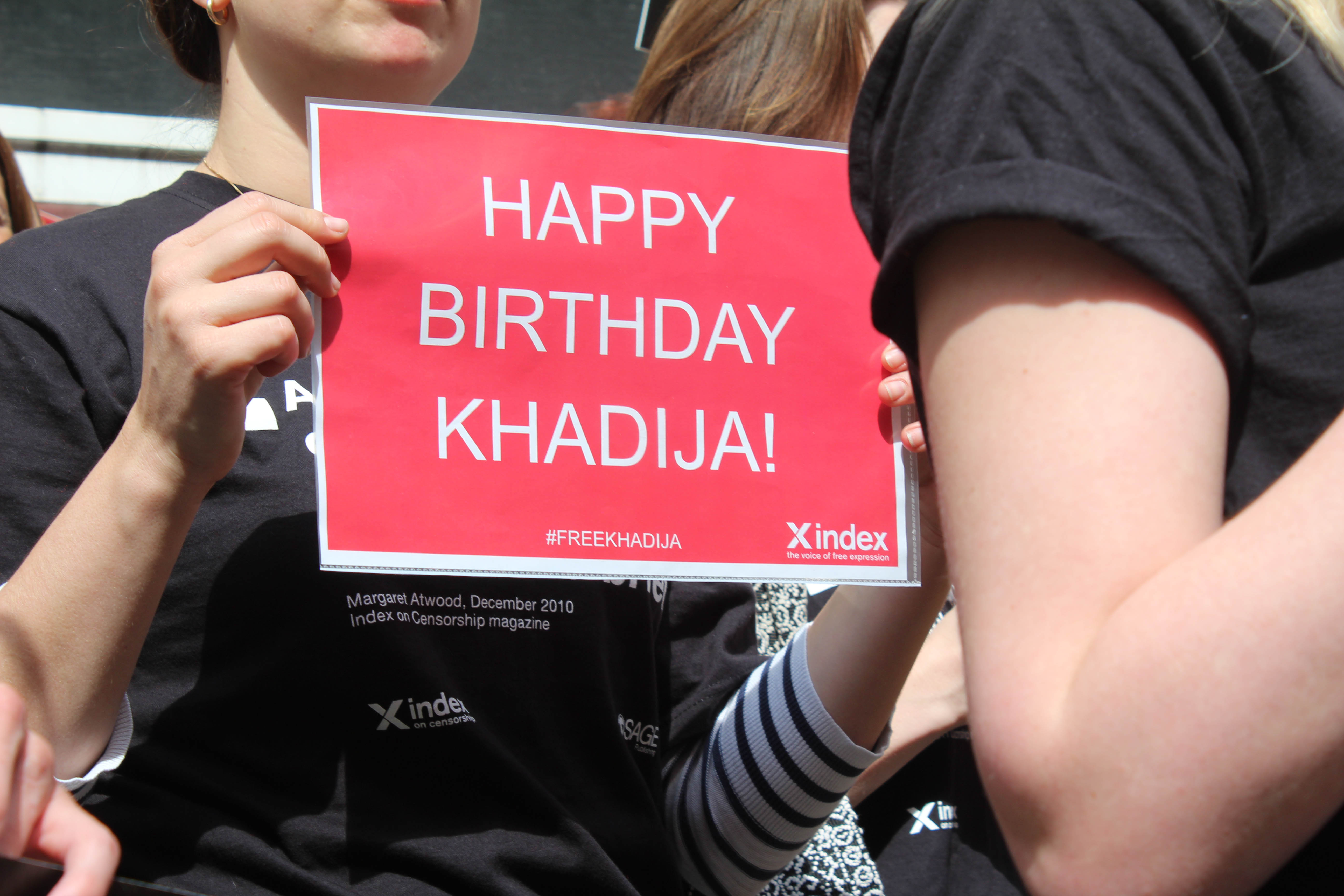
Protest for Khadija Ismayilova, Azerbaijan embassy, London. Credit: Cat Lucas, English Pen
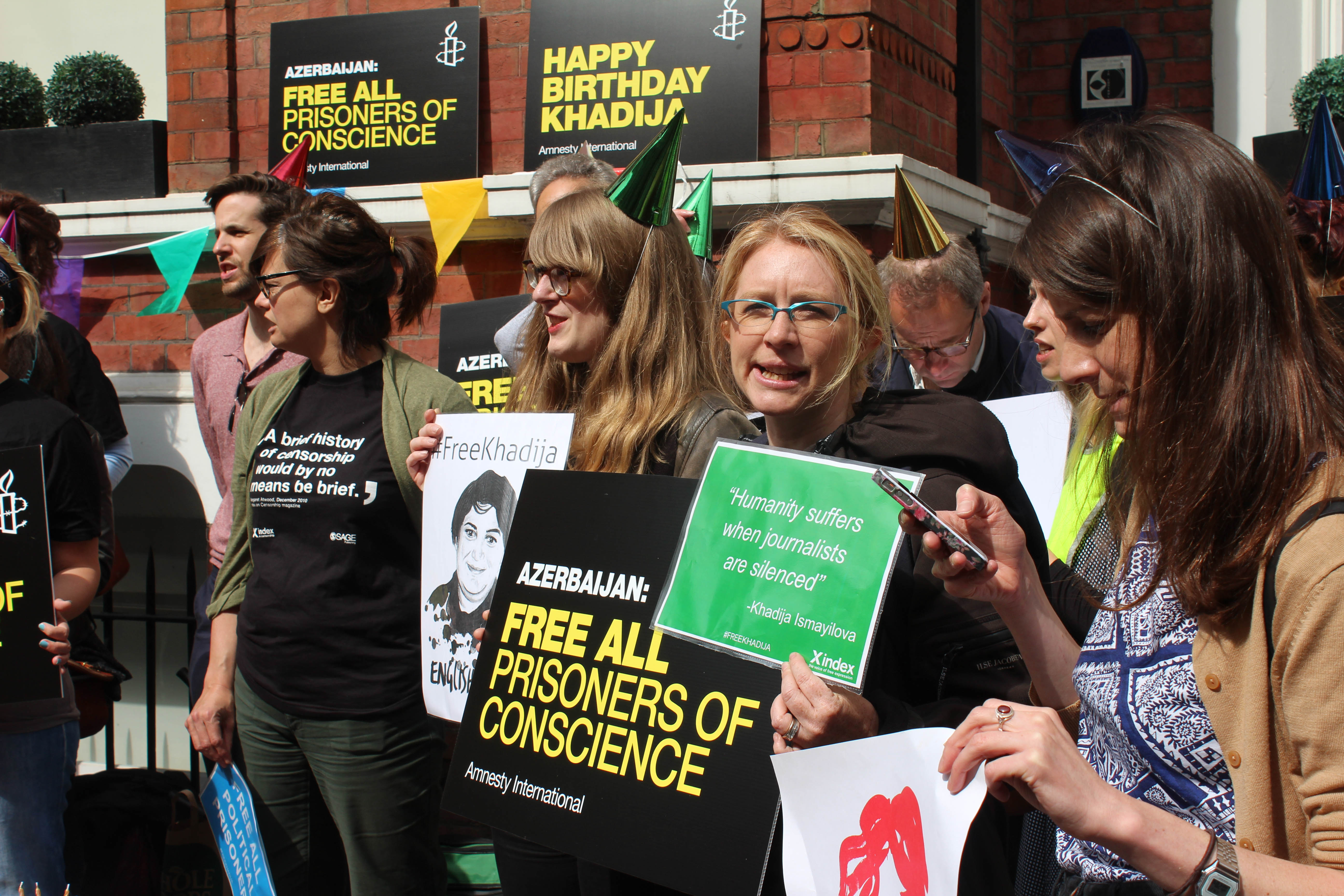
Protest for Khadija Ismayilova, Azerbaijan embassy, London. Credit: Cat Lucas, English Pen
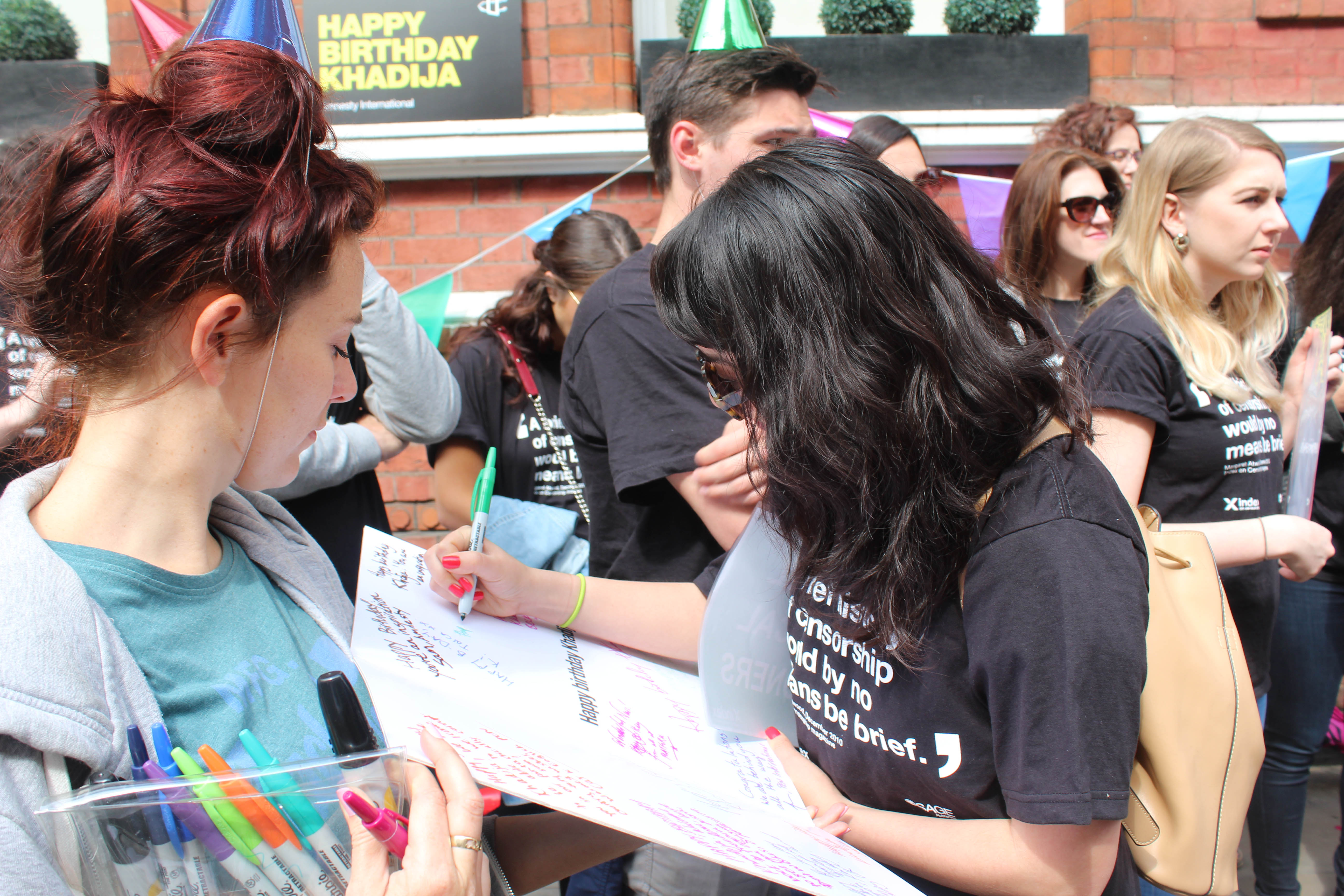
Protest for Khadija Ismayilova, Azerbaijan embassy, London. Credit: Cat Lucas, English Pen
Writing birthday wishes to @khadija_ismayil @melodypatry picks up her pen pic.twitter.com/nNBOsP8h9E
— IndexCensorshipMag (@Index_Magazine) May 27, 2016
Many more protests took place today. Here are some of them:
The #RSF team is celebrating #Khadija‘s birthday in front of the #Azerbaidjan Embassy. Happy bday! https://t.co/h7YEhlEvaV
— RSF (@RSF_inter) May 27, 2016
Thank you @RepMcGovern for joining us to celebrate @Khadija_Ismayil birthday and release! #FreeKhadija pic.twitter.com/sWMaM2z2zw
— Freedom Now (@freedomnoworg) May 26, 2016
Today we celebrate @Khadija_Ismayil but also remember dire #humanrights situation in #Azerbaijan,call #EU for action pic.twitter.com/PYQPLAY1gE
— Alexander Sjödin (@AJSjodin) May 27, 2016
Norwegian journalist Oystein Windstad demands freedom for Seymur Hazi @FrittOrd@SportForRightspic.twitter.com/d4jU6zbvQH
— NHC (@nhc_no) May 27, 2016

Turkish President Recep Tayyip Erdogan (Photo: Philip Janek / Demotix)
The ongoing deterioration in Turkey’s press freedom has been well documented by Index on Censorship’s Mapping Media Freedom project since its launch in 2014. The crackdown appears to be getting worse, according to a new report by Amnesty International this month. It states that the “human rights situation deteriorated markedly” in Turkey in 2015, as did respect for freedom of expression, including criminal detention though anti-terror laws and the targeting of anyone critical of government policy.
Despite the welcome release of Cumhuriyet journalists Can Dündar and Erdem Gül on 26 February, the situation for media freedom looks uncertain. Here are some of the most worrying reports from February.
In total, Mapping Media Freedom has recorded the deaths of 15 journalists since July 2014. Seven of these deaths have occurred in Turkey, two of those in this year alone. Gülsen Yıldız, a journalist working in Ankara for Tarim TV, was killed on 18 February. She was among 28 people who died during a terrorist attack on passing military vehicles in the capital.
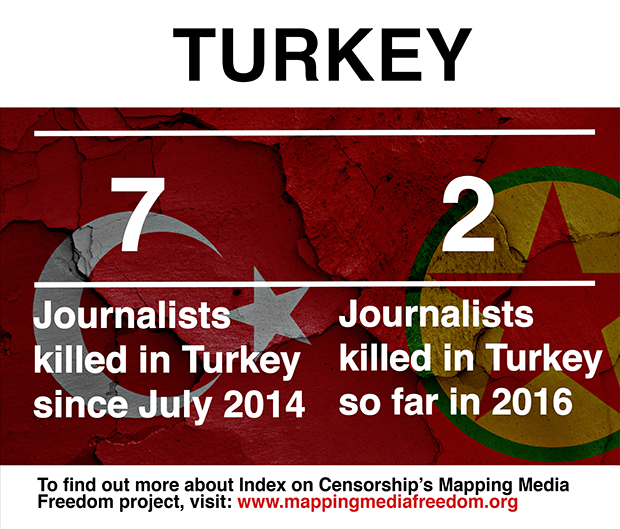
Source: Index on Censorship / Mapping Media Freedom
Later in February, the discovery of a body, later identified as journalist Rohat Aktaş, in the southeastern town of Cizre. Aktaş had been shot in the arm in late January while covering efforts to help those wounded during clashes between Kurdish separatists and Turkish forces.
On 24 February, Dicle-Haber reported that Aktaş’ body was identified by DNA tests carried out by the forensic authority. “Scores” of people are reported to have been killed in Cizre following a raid by security services on buildings they say harboured Kurdish separatist fighters. The exact details of Aktaş’ death are currently unknown.
This year began on a somewhat positive note with the 5 January release of VICE News journalist Mohammed Ismael Rasool. Rasool, an Iraqi Kurdish reporter, had been detained since 27 August 2015 while reporting in the country’s southeast and charged with working for a terrorist organisation.
On 11 February, Nazım Daştan, a journalist for Dicle News Agency (DİHA), which reports in Kurdish, was arrested in Gaziantep on charges of spreading online propaganda for the Kurdistan Workers’ Party (PKK), which the Turkish state lists as a terrorist group. On the next day, he was brought to testify in court and then taken to jail.
On the same date, Feyyaz İmrak, also journalist for Dicle News Agency (DİHA), was arrested along with 16 others on charges of being members of the PKK. Police searched his home and confiscated his reporting equipment and notes.
İmrak appeared before a criminal court 15 February to hear the charges against him, and is currently being held at Antalya Prison, pending trial.
Gazeteci Silje Rønning Kampesæter nişanlısı Kürt olduğu için Türkiye’den kovulmuş. #BravoAKP https://t.co/DHsxSV85rh pic.twitter.com/voLl4FJfWX
— Stefan Fenzi (@sfen_) February 10, 2016
For any journalist, access to sources is essential for their ability to carry out their duties. The denial of access is a major problem for journalists in Turkey, something foreign journalists know all too well.
On 9 February, Turkish authorities rejected a permanent press accreditation application filed by Silje Rønning Kampesæter, a correspondent for Norway’s Aftenposten. The press accreditation application also affects her residence permit in Turkey. No reason was given for the rejection.
The authorities also detained Claus Blok Thomsen, a Danish journalist working for Denmark’s daily newspaper Politiken, at the Istanbul airport, barring him from entering the country. The journalist was seeking access to report on refugees at the Turkish-Syrian border.
When Thomsen identified himself as a journalist, police forced him to open his phone and computer, undermining the confidentiality of his sources. He was then detained in a cell overnight and put on a plane to Copenhagen the next day. He was reportedly told to not try re-entering Turkey.
Also see:
Statement: Index condemns seizure of Zaman
Sign Our Petition: End Turkey’s crackdown on press freedom
Letter: Writers and artists condemn seizure of Zaman news group
Reaction: Turkish court orders seizure of Zaman news group
This article was originally published at Index on Censorship.
Mapping Media Freedom
|
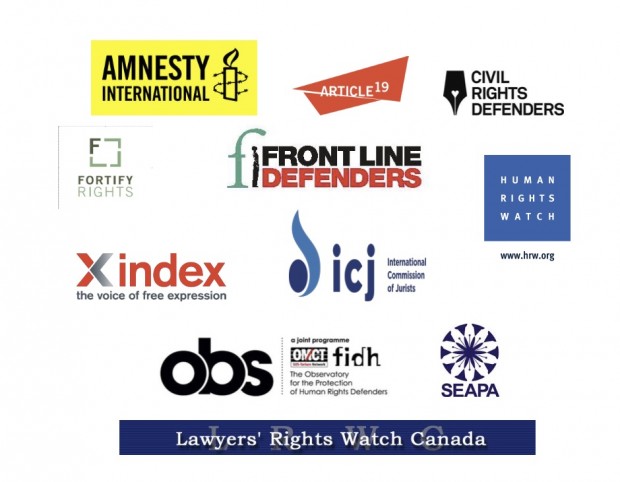
Dear Attorney General Mohamed Apandi Ali,
We write to you as organisations that are deeply concerned by the decision of the Malaysian authorities to prosecute Lena Hendry for her involvement in the screening of the award-winning human rights documentary, “No Fire Zone: The Killing Fields of Sri Lanka,” in Kuala Lumpur on July 9, 2013. The charges against her violate Malaysia’s obligations to respect the rights to freedom of opinion and expression, notably to receive and impart information. We respectfully urge you to drop the charges against Hendry. Her trial in Magistrate Court 6 in Kuala Lumpur is slated to begin on December 14, 2015.
As you know, Hendry is being charged under section 6 of the Film Censorship Act 2002, which imposes a mandatory prior censorship or licensing scheme on all films before they can be screened at any event, except films sponsored by the federal government or any state government. If convicted, she faces up to three years in prison and a fine up to RM 30,000.
The prosecution appears intended to restrict the activities of Hendry and members of the KOMAS, the human rights education and promotion organisation with which she works, by hindering their efforts to provide information and share their perspectives on human rights issues.
International human rights law and standards, such as found in article 19 of the Universal Declaration of Human Rights, states that “everyone has the right to freedom of opinion and expression; this right includes freedom to hold opinions without interference and to seek, receive, and impart information and ideas through any media and regardless of frontiers.”
Malaysia has committed to ensuring that all human rights defenders are able to carry out their activities without any hindrance or fear of reprisals from the government. In November, Malaysia voted in favor of a resolution on “Recognizing the role of human rights defenders and the need for their protection” in the 3rd Committee of the United Nations General Assembly. The resolution set out the urgent need for governments to protect human rights defenders worldwide. Article 1 of the UN Declaration on Human Rights Defenders, adopted unanimously by the UN General Assembly on December 9, 1998, states that “everyone has the right, individually and in association with others, to promote and to strive for the protection and realization of human rights and fundamental freedoms at the national and international levels.” Article 12(2) provides that the government shall “take all necessary measures to ensure the protection by the competent authorities of everyone, individually and in association with others, against any violence, threats, retaliation, de facto or de jure adverse discrimination, pressure or any other arbitrary action as a consequence of his or her legitimate exercise of his or her rights.”
In addition to dropping the charges against Hendry, we also urge you, as attorney general, to seek to repeal provisions of the Film Censorship Act 2002 that allow unnecessary and arbitrary government interference in the showing of films in Malaysia. This policy denies Malaysians the opportunity to benefit from a range of viewpoints on issues of importance to Malaysian society and that affect Malaysia’s role in the world.
Sincerely,
Brad Adams
Director, Asia Division
Human Rights Watch
Gail Davidson
Executive Director
Lawyers’ Rights Watch Canada
Jodie Ginsberg
Chief Executive
Index on Censorship
Karim Lahidji
President
International Federation for Human Rights (FIDH)
Mary Lawlor
Director
Front Line Defenders
Edgardo Legaspi
Executive Director
Southeast Asian Press Alliance (SEAPA)
Marie Manson
Program Director for Human Rights Defenders at Risk
Civil Rights Defenders
Champa Patel
Interim Director, South East Asia and Pacific Regional Office
Amnesty International
Amy Smith
Executive Director
Fortify Rights
Oliver Spencer
Head of Asia
Article 19
Gerald Staberock
Secretary General
World Organization Against Torture (OMCT)
Sam Zarifi
Regional Director for Asia and the Pacific
International Commission of Jurists
Cc:
Ahmad Zahid Hamidi, Minister of Home Affairs
Joseph Y. Yun, Ambassador of the United States of America to Malaysia
Luc Vandebon, Ambassador of the European Union to Malaysia
Victoria Treadell, British High Commissioner to Malaysia
Christophe Penot, Ambassador of France to Malaysia
Holger Michael, Ambassador of Germany to Malaysia
Rod Smith, Australian High Commissioner to Malaysia
Judith St. George Canadian High Commissioner to Malaysia
Dr John Subritzky, New Zealand High Commissioner to Malaysia
Ibrahim Sahib, Sri Lanka High Commissioner to Malaysia
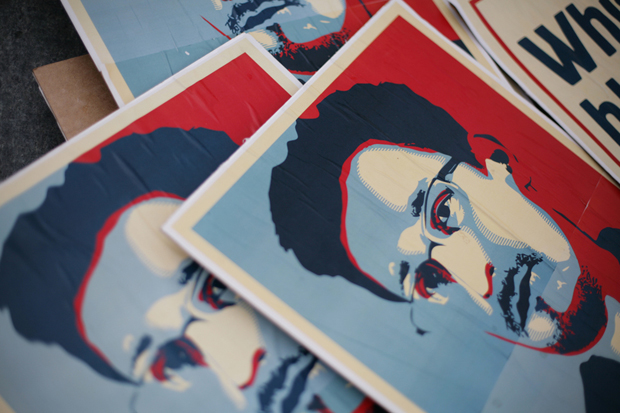
(Photo: David von Blohn / Demotix)
Edward Snowden’s revelations on the voracious appetite of spying on all and sundry by the National Security Agency and allied agencies should not give pause for too much comment, other than to affirm a general premise: Activists and non-government groups are to be feared. Non-profits are seen as potential threats, though what to is sometimes unclear. Any government worth its salt should be afraid of its citizens – the latter must make the former accountable; the former must hold to the contractual bargain with citizens.
Last week, Snowden revealed to members of the Council of Europe via videolink from Moscow that such groups as Human Rights Watch and Amnesty International were high on the list of surveillance targets. “The NSA has specifically targeted either leaders or staff members in a number of civil and non-governmental organisations… including domestically within the borders of the United States.” He also delved further into such data mining programs as XKeyscore, a technology representing “the most significant new threat to civil liberties in modern times.” Analysts, using the program, can select the metadata of an individual, and find content, “without judicial approval or prior review.”
Dinah PoKempner, general counsel at Human Rights Watch, responded that, if true, it was “indicative of the overreach that US law allows to security agencies.” Such conduct “would again show why the US needs to overhaul its system of indiscriminate surveillance.” Indeed, it would fly in the face of a long held, if somewhat erroneous belief, that the US State Department actually treasures its human rights defenders, seeing them as the vanguard of reform rather than a cabal of troublesome dissent. Human rights defenders in allied countries, for instance, pose a different set of problems.
A cursory glance at the guidelines of the US State Department on supporting human rights reveals how, “Protecting and supporting human rights defenders is a key priority of US foreign policy…. The Department’s objective is to enable human rights defenders to promote and defend human rights without hindrance or undue restriction and free from fear of retribution against them or their families.” Stirring stuff. There is even a reference to US support for the UN Declaration on Human Rights Defenders, adopted by consensus of the General Assembly in 1998. Various strategies and techniques of encouragement are then discussed.
The guidelines even set out who human rights defenders are – those who “working alone or in groups, who non-violently advocate for the promotion and protection of universally recognised human rights and fundamental freedoms.”
Evidently, these guidelines did not quite cross the tables of those involved in the surveillance complex. This may well be partly due to bureaucratic bungling – the irresistible growth of the espionage complex, but it may just as well be seen as consistent: after all, the NSA watches, and the State Department disposes. The two occasionally seem to meet in fumbling circumstances.
The NSA is far from the only organisation engaged in the business of spying on activist groups and NGOs. A November 2013 report by Centre for Corporate Policy, a Washington, D.C. think tank, titled Spooky Business: Corporate Espionage Against Nonprofit Organizations, shows that such a process is addictive and systematic across centres of power. Aversion to dissent is endemic, and it attracts birds of a feather in both government and corporate circles. According to the report, the precondition for such espionage is that the non-profit organisation in question “impairs or at least threatens a company’s assets or image sufficiently.” The targets are varied, including “environmental, antiwar, public interest, consumer, food safety, pesticide reform, nursing home reform, gun control, social justice, animal rights and arms control groups.”
The report looks at the antics of numerous entities hungry for data on their threatening quarry. It might be the Society of Toxicology and Information Associates against animal rights activists. It might be Stratfor and Coca-Cola against People for the Ethical Treatment of Animals. Or BAE against Campaign Against the Arms Trade.
The gold target here seems to be Greenpeace, object of keen interest by the private security firm Beckett Brown International (BBI), retained by Dow Chemical, the world’s largest chlorine producer. The world’s largest operator of nuclear power plants, Électricité de France, has also hired a set of private intelligence firms to keep an eye on the activities of the organisation, be it through good old hacking or conventional spying. In November 2011, EDF was actually fined €1.5 million for “industrial espionage”, and two of its executives jailed.
Activities include infiltration, cultivation, deception. Trash bins are searched. Offices are cased, phone records of activists collected, confidential meetings breached. Names are blackened; the severity of disasters – environmental, notably – are minimised. According to Russell Corn, the managing director of Diligence, a corporate intelligence agency, anywhere up to 25 per cent of an activist camp will be “taking the corporate shilling” (New Statesman, Aug 7, 2008). An inflated figure, perhaps, but worth keeping in mind.
Such behaviour illustrates all too well that there is a conflict of an international, global dimension between established centres of corporate and government power against those who would reform, or at the very least challenge, them. When convenient, corporate and government interests will collude and find accord. There is even an argument to be made that their functions and interests have become, at points, indistinguishable.
Nothing illustrates this better than the privatisation phenomenon of intelligence activities, where traditional espionage is outsourced and redeployed with contracting agencies and their employees. The private investigative firm Hackluyt, retained by BP and Shell, has a direct line to MI6. Some irony, then, that Snowden was working for one such agency when he acquired his invaluable treasure trove of surveillance activities.
This article was posted on 16 April 2014 at indexoncensorship.org